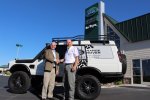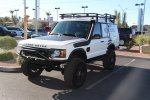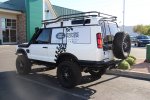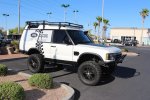Contact the Blue Ribbon Coalition or other organizations that support vehicular recreation on public lands and you will find near unanimous agreement that the Nature Conservancy does like what we do and works to limit or stop this type of recreation.
Here is some of the Natures Conservancies Land Use policies. Not all areas have the same policies, but this is a good description of how they manage their lands.
Preserve Use Policies
Please respect the precautionary approach we take to human uses on the lands we manage.
SPME070725_D316
The Nature Conservancy is a private, nonprofit conservation organization dedicated to the preservation of the plants, animals, and natural communities that represent the diversity of life on Earth by protecting the lands and waters they need to survive. Given our focused biodiversity conservation mission, the Conservancy takes a precautionary approach to human uses on the lands we manage. Please respect of these policies when visiting our preserves so that future generations can continue to enjoy the great places of Maine.
Uses Generally Allowed
Hiking, Walking and Nature Observation – Please stay on maintained trails to avoid detrimental impacts to the local ecology. Some trails are closed or re-routed to minimize detrimental impacts and to protect sensitive habitats and some island preserves are closed during bird nesting season.
Canoeing, Kayaking, and Other Non-motorized Boating – Many water bodies on Conservancy preserves are accessible for the public use, although The Nature Conservancy does not actively maintain boat access with the exception of the Debsconeag Lakes Wilderness Area.
Snowshoeing and Cross Country Skiing – Many preserves are available for snowshoeing and skiing; however, trails and access are often not maintained during the winter. Similar guidelines apply as for hiking, walking and nature observation.
Hunting and Fishing – Hunting and fishing are allowed on most Conservancy preserves in Maine. Hunting is a traditional land use in Maine, and by State statute lands are open to hunting and fishing unless a landowner posts the boundaries against these activities. We do not believe hunting poses adverse impacts or significant threat to our conservation goals in Maine. Fishing is also a longstanding use, and many water bodies are in the public trust and governed by State fishing statute. Some preserves, or portions thereof, are closed to hunting due to donor wishes (Placentia Island) or safety concerns (Fernald’s Neck, Indian Point-Blagden). Shelters and blinds are not allowed on any preserve. Warning signs may be posted around trails and parking lots to warn visitors that hunters may be on the preserve and to warn hunters that they are entering a high visitor use area of the preserve. Warning signs to ask visitors to wear blaze orange during the deer hunting season are posted at entrances to heavily visited preserves.
Harvesting of Berries – Traditional harvesting/foraging of berries for personal use is permitted.
Uses Allowed with Prior Permission
The following activities require advance written permission. Please call 207-729-5181 or contact
naturemaine@tnc.org to find out how to obtain permission.
Research and Field Study – Individuals from educational, research, academic, governmental or other recognized institution can conduct non-destructive field study and research on Conservancy preserves with prior written permission.
Educational Programs and Field Trips – Many non-profit organizations and school groups use Conservancy preserves for environmental programs and educational field trips. Interested parties larger than 12 people should contact The Nature Conservancy for general permission, and should notify the Conservancy prior to each use to ensure compliance with management guidelines and to avoid conflict with any other events or management activities. With the exception of registered Maine Guides on the Upper St. John River and Debsconeag Lakes Wilderness Area, use of our preserves by a commercial entity that charges a fee is not permitted.
Uses Considered on a Case-by-Case Basis
Please call 207-729-5181 or contact
naturemaine@tnc.org to find out whether the activity you are interested in is permitted on a particular preserve.
Snowmobiling – Snowmobiling on pre-existing or established trails is allowed on some Conservancy preserves, particularly where there were established and maintained trails at the time of our acquisition and there is a club in good standing to maintain the trails and enforce use guidelines. Clubs are required to enter into use agreements for any trails on Conservancy property and must carry liability insurance.
Geocaching – Placing of geocaches is generally discouraged because of the disturbance to areas off-trail. Geocaches are considered on a case-by-case basis and must be placed in a location and manner that avoids disturbance or alteration to any significant natural feature or area of ecological concern. We ask that any geocaches listed on the geocaching website without Conservancy permission be removed.
Uses Generally Prohibited
The following uses are generally inconsistent with The Nature Conservancy’s mission, goals, or policies and procedures, and are not allowed on Conservancy preserves.
Motorized Vehicles – All motorized vehicles are prohibited. Exceptions include snowmobile use (see above), use of motorized vehicles for Conservancy management purposes, and use of motorized vehicles in emergencies (e.g., medical, rescue, fire). In special cases, ATV trails may be allowed if there is a pre-existing use at the time of acquisition, and there is a club in good standing to maintain the trail and enforce trail guidelines. Where trails are permitted, the club must enter into a use agreement with TNC and must carry liability insurance. Maine law prohibits the operation of ATVs on wetlands, intertidal zones, sand dunes, bogs, alpine summits, or crop and pasture land. Maine law also requires ATV users to get landowner permission before riding on private property.
Mountain Biking – Mountain biking is prohibited. Because of effects on trail conditions, especially on steep slopes and erodable soils, biking can have unintended impacts. Biking will only be considered where there is a pre-existing use and/or a suitable trail exists that can handle the impacts (such as old gravel logging roads that are no longer used for hauling timber).
Collecting – Collection of plant, animal, mineral or other specimens is prohibited, except for approved scientific purposes (see above). Commercial collecting of any kind is prohibited.
Commercial Timber Harvesting – Commercial timber harvesting is prohibited, except where utilized as part of an ecological management regime designed to maintain, restore, or mimic key biodiversity features and ecological processes, or as a demonstration of forest practices that incorporate biodiversity considerations.
Fire – All fires including campfires are prohibited, except for Conservancy–approved prescribed fires conducted by trained staff or designees and at designated campsites on the Upper St. John River and Debsconeag Lakes Wilderness Area.
Camping – In general, Maine Chapter preserves are only open from dawn to dusk and camping is prohibited, except at designated campsites on the Upper St. John River and Debsconeag Lakes Wilderness Area. We encourage all campers to use Leave No Trace ethics. For those sites with authorized camping, guidelines are posted at each campsite indicating appropriate use and length of stay. Exceptions are made to the no camping policy only to nonprofit, educational institutions which, based on annual written request, are granted permission to use specific sections of a few preserves for limited and supervised overnight use, following the principles of low-impact camping. Camping represents a serious potential threat to natural areas because of the accompanying threat of fire and increased impact on vegetation.
Pets and Domesticated Animals – Pets are generally prohibited with the exception of ADA requirements, “seeing eye dogs” and other assistance animals. Pets are inappropriate visitors to Conservancy preserves because they can disturb wildlife, impede enjoyment of the preserve by other visitors, spread diseases to wildlife, or leave stools that may create a serious sanitation problems or contain seeds from non-native plants. Horseback riding may be allowed only where there is a pre-existing trail at the time of acquisition and the trail is on a surface that will stand up to heavy use and is away from any sensitive natural areas.
Technical Rock/Ice/Mixed Climbing – Technical rock, ice, free or “mixed” climbing are prohibited.
Feeding of Wildlife – Feeding of wildlife is prohibited.
Trapping – Trapping (with the exception of beaver) in organized towns requires the written consent of the landowner by Maine statute. Currently, trapping is not permitted on any Maine Chapter preserve within an organized town with the exception of live-trapping for the purpose of endangered species protection directly authorized and implemented by the Maine Department of Inland Fisheries and Wildlife Animal Damage Control Program.
Baiting and Hunting with Dogs – In general, baiting of wildlife, including hunting bear over bait is prohibited. In addition, we have allowed bear baiting on established sites for the first season following acquisition of some lands in northern Maine in order to give guides time to find alternate locations. We generally do not allow hunting with dogs.
Shelters, Blinds, and Tree Stands – Construction and establishment of semi-permanent shelters, blinds or stands is prohibited, except in association with permitted scientific research.
Motorized Watercraft – Motorized watercraft (gasoline or electric) are prohibited, to the extent that state law allows TNC to establish this restriction. Exceptions may be made for Conservancy management purposes (for instance, traveling across ponds to backcountry sites in the Debsconeags).
Hang Gliding, Personal Aircraft, and Ultralights – All self-propelled or other aircraft are prohibited from taking off or landing on any Conservancy preserve unless it is associated with Conservancy management purposes (such as delivery of materials to islands via helicopter). Float planes often land on ponds within TNC preserves, but the Conservancy does not have regulatory authority over great ponds (>10 acres).
“War” Games/Paintball Games – Paintball or “capture the flag” type games are prohibited.
February 21, 2011
Read More
Photo Special Features Tab
Close Encounters with Nature
Whether scary or exciting, nature has a way of sneaking up on you. See stories
Arden OConnor 215x143
Nature Matters
Hear some of nature's success stories and see how nature matters to us all. Watch videos
Give for Future Generations
Generations CTA image
Help protect nature for future generations by becoming a monthly giver. It’s fast, reliable and paperless!
Give Now!
Explore Related Content
This Land is Your Land
Check out the top 10 public lands in Maine created or expanded through the Conservancy's work. Explore now
Places We Protect
Learn more about the special places we protect in Maine. Learn more
The Nature Conservancy
Contact Us
Help/FAQs
Provide Feedback
Newsroom
Working With Companies
Our Advertisers
Our Sites
All Hands Music
Conservation Gateway
Blogs
Magazine
Nature Rocks
Nature Works Everywhere
Connect With Us
My Nature Page
Twitter
Facebook
Youtube
Flickr
Mobile Apps
Photos and Video
About Us
Vision and Mission
Our Governance
Financials
Why We're Effective
Diversity
Careers
Our Stories
How We Work
Habitats
Regions
Urgent Issues
Get Involved
Adopt an Acre
All Hands on Earth
Plant a Billion Trees
Use Your Outside Voice
Send a Nature E-Card
Green Living Tips
Carbon Calculator
Volunteer
Where We Work
Worldwide
Africa
Asia and the Pacific
Caribbean
Central America
Europe
North America
South America
Our Science
Conservation By Design
Our Scientists
Science Council
Science Features
Our Accountability
The Nature Conservancy makes careful use of your support.
More Ratings
BBB Accredited Charity
Charity Navigator
DMA Organization of the Year
Donate
Donate Now
Monthly Giving
Memorials and Tributes
Gift Planning
Membership
Become a Member
Renew Membership
Gift Memberships
Member Benefits
Shop





